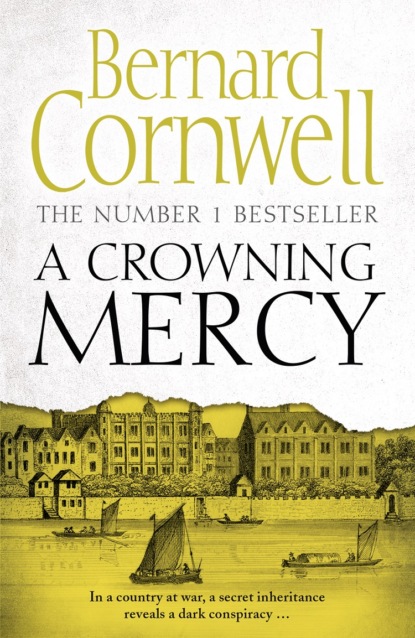По всем вопросам обращайтесь на: info@litportal.ru
(©) 2003-2025.
✖
A Crowning Mercy
Настройки чтения
Размер шрифта
Высота строк
Поля
‘Apple pie!’ Samuel Scammell linked his hands, smiled, then cracked his knuckles. ‘I like apple pie, indeed and indeed!’
‘Dorcas?’ Her father indicated that she should serve. She gave herself a tiny sliver that brought a sniff of disapproval from Goodwife who was bringing lit candles to the table.
Samuel Scammell made short work of two helpings, gobbling the food as though he had not eaten in a week, and swilling it down with the small beer that was served this night. Matthew Slythe never served strong drink, only water or diluted ale.
The pie was finished without further talk and then, as Campion expected, the conversation was of religion. The Puritans were divided into a multiplicity of sects, disagreeing on fine points of theology and offering men like her father and Brother Scammell a splendid battleground for anger and condemnation. Ebenezer joined in. He had been studying Presbyterianism, the religion of Scotland and much of England’s Parliament, and he attacked it splenetically. He leaned into the candlelight and Campion thought there was something fanatical in his thin, shadowed face. He was speaking to Samuel Scammell. ‘They would deny our Lord Jesus Christ’s saving grace, brother! They would dispute it, but what other conclusion can we draw?’
Scammell nodded. ‘Indeed and indeed.’
The sky had gone ink black beyond the windows. Moths flickered at the panes.
Samuel Scammell smiled at Campion. ‘Your brother is strong in the Lord, Miss Slythe.’
‘Yes, sir.’
‘And you?’ He leaned forward, his small eyes intent on her.
‘Yes, sir.’ It was an inadequate answer, one that made her father stir in suppressed wrath, but Scammell leaned back happy enough.
‘Praise the Lord. Amen and amen.’
The conversation, thankfully, passed from the state of her soul to the latest stories of Catholic atrocities in Ireland. Matthew Slythe warmed to the subject, anger giving his words wings, and Campion let the phrases hammer unheard about her head. She noticed that Samuel Scammell was stealing constant looks at her, smiling once when he caught her eye, and she found it unsettling.
Toby Lazender had said she was beautiful. She wondered what he did in London, how he liked a city ‘cleansed’ by the Puritans he so disliked. She had asked Charity, three weeks before, if a visitor had been in church and Charity had said yes. A strong young man, she said, with red hair, who had bellowed out the psalms in a loud voice. Campion was sad. She guessed Toby must have thought she did not want to see him again. She saw Samuel Scammell staring at her again and it reminded her of the way other men looked at her, even, though she found it hard to believe, the Reverend Hervey. Scammell seemed to eye her as a bull might a heifer.
The owl that hunted the beech ridge sounded in the night.
Samuel Scammell excused himself from the table and walked down the stone-flagged passage that led to the close-chamber.
Her father waited till his footsteps stopped, then looked at his daughter. ‘Well?’
‘Father?’
‘Do you like Brother Scammell?’
Her father did, so her answer was obvious. ‘Yes, father.’
Scammell had not closed the chamber door and she could hear him urinating into the stone trough, a sound just like that of a horse staling in the stable-yard. It seemed to go on for ever.
Ebenezer scowled at the candles. ‘He seems sound in his beliefs, father.’
‘He is, son, he is.’ Matthew Slythe leaned forward, his face gloomy as he stared at the remains of the apple pie. ‘He is blessed of God.’
The splashing still sounded. He must have the bladder of an ox, Campion thought. ‘Is he here to preach, father?’
‘Business.’ Her father gripped the table top and seemed to brood. A pulse throbbed at his forehead. The sound of Scammell’s pissing stopped, started again, then faded in spurts. Campion felt sick. She had hardly eaten. She wanted to be out of this room, she wanted to be in her bed where she could lie and dream her private dreams of the world beyond the high yew hedge.
Samuel Scammell’s footsteps were loud in the passage. Matthew Slythe blinked, then put a welcoming smile on his face. ‘Ah! Brother Scammell, you’re back.’
‘Indeed and indeed.’ He waved a pudgy hand towards the passage. ‘A well-appointed house, brother.’
‘Praise God.’
‘Indeed and indeed.’ Scammell was standing by his chair, waiting for the mutual praise of God to cease. Campion saw a dark, damp patch on his breeches. She looked at the table instead.
‘Sit down, brother! Sit down!’ Her father was forcing jollity into his voice, a heavy-handed jollity that was only used with guests. ‘Well?’
‘Yes, indeed yes.’ Scammell hitched up his breeches, scooped his coat aside and scraped his chair forward. ‘Indeed.’
‘And?’
Campion looked up, alerted by the inconsequential words. She frowned.
Scammell was smiling at her, his nostrils cavernous. He wiped his hands together, then dried them on his coat. ‘“Who can find a virtuous woman? For her price is far above rubies. The heart of her husband doth safely trust in her, so that he shall have no need of spoil. She will do him good and not evil all the days of her life.”’
‘Amen,’ Matthew Slythe said.
‘Praise the Lord,’ Ebenezer said.
‘Indeed and indeed,’ Samuel Scammell said.
Campion said nothing. A coldness was on her, a fear at the very centre of her.
Her father looked at her and quoted from the same chapter of Proverbs. ‘“Favour is deceitful, and beauty is vain: but a woman that feareth the Lord, she shall be praised.”’
‘Amen,’ said Brother Scammell.
‘And amen,’ said Ebenezer.
‘Well?’ asked Matthew Slythe.
Samuel Scammell licked his lips, smiled, and patted his stomach. ‘I am honoured by your offer, Brother Slythe, and have laid it prayerfully before the Lord. It is my fervent belief that I must accept.’
‘Amen.’
Scammell looked at Campion. ‘We are to be united as husband and wife, Miss Slythe. A happy day, indeed and indeed.’
‘Amen,’ said Ebenezer.
Scammell looked at Ebenezer. ‘We are to be brothers, Ebenezer, in family as in God.’
‘Praise Him.’
She had known, she had known, but she had not dared accept the knowledge. Her fear burned, tears pricked at her, but she would not cry in front of them. Her father was smiling at her, not in love, but as an enemy might smile when he sees his foe humiliated. ‘Brother Hervey will read the banns beginning this Lord’s Day.’
She nodded, incapable of fighting him. She was to be married in one month. She would be Dorcas for ever. Dorcas Slythe would become Dorcas Scammell, and she could never be Campion.
‘Amen and amen,’ said Samuel Scammell, ‘a happy day!’











